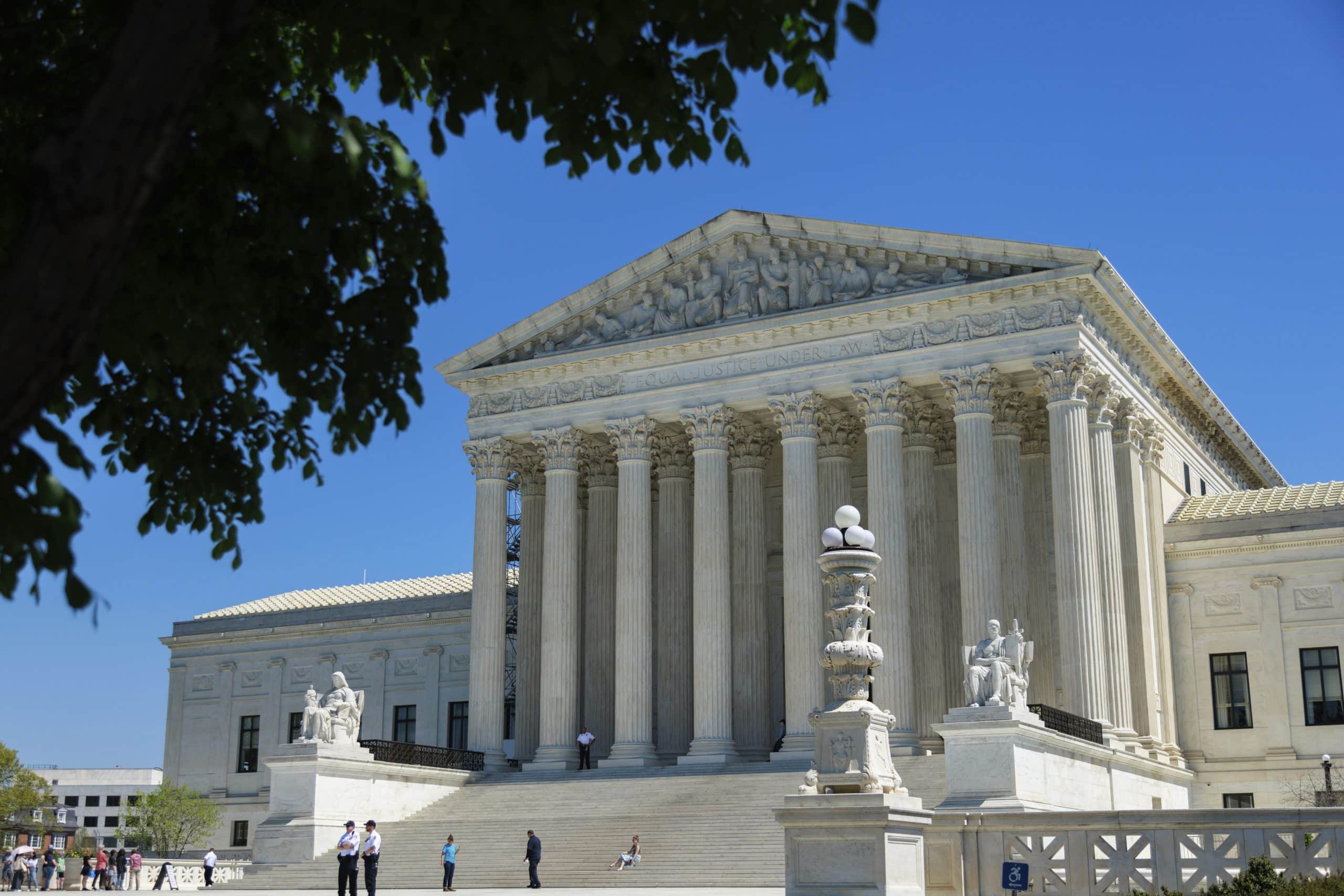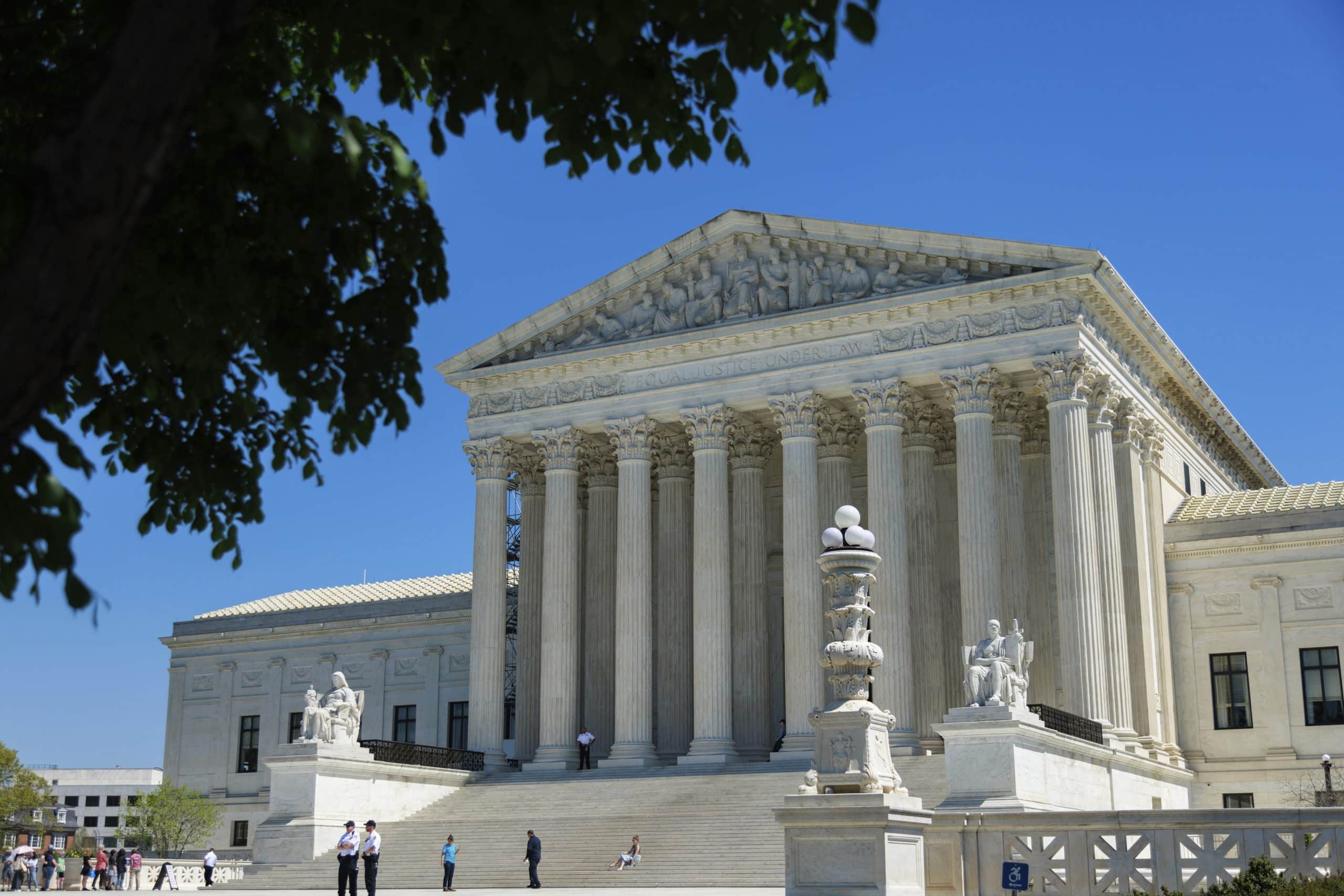Mississippi Today
U.S. Supreme Court ends efforts to right wrongs of the 1890 Mississippi Constitution


For decades, starting primarily in the 1950s, the federal courts have stepped in to right the wrongs of Mississippi’s racist 1890 Constitution.
Let it be known that on June 30, 2023, the U.S. Supreme Court said in its view the wrongs had already been corrected. The nation’s highest court announced its refusal on that day to hear a case challenging the centuries-old Mississippi Constitution provision that imposes a lifetime ban on voting for people convicted of certain felonies.
The provision, it was clear at the time — even boasted by the framers of that 1890 constitution — was enacted as one of the many tools to keep Black Mississippians from voting.
There was a racist belief then that African Americans were more prone to commit certain crimes, so they imposed the lifetime felony voting ban. At the time, the provision imposed a lifetime voting ban on a person convicted of bigamy or perjury, for instance, but not for someone who committed murder or rape.
The Mississippi Center for Justice and other groups that filed the lawsuit in 2017 on behalf of people who have lost their right to vote argued before the federal court that because of the racist origin of the provision, it should be struck down. The federal courts in landmark cases have struck down other Mississippi constitutional provisions designed to keep African Americans from voting, such as the poll tax and so-called literacy tests. And, of course, other provisions of the state’s 1890 Constitution not related to voting, such as the absurdly labeled separate-but-equal schools, have been famously invalidated by the federal court.
READ MORE: Few options remain for Mississippians convicted of certain felonies to regain voting rights
The Supreme Court justices did not say why they refused to hear the felony suffrage case.
But a majority of the U.S. 5th Court of Appeals ruled in 2022 the provision was not unconstitutional because “the racial taint” from 1890 had been removed by actions taken in the 1950s and 1960s by the Mississippi Legislature. The 5th Circuit reasoned that legislators passed resolutions approved by voters to add murder and rape as disenfranchising crimes. The changes removed the racial taint, the judicial majority ruled. Notably, the electorate was not given an opportunity to vote on whether to keep the original racially motivated crimes as disenfranchising crimes.
So, some including Supreme Court Justice Ketanji Brown, who disagreed with the majority decision not to hear the case, questioned whether the racial taint had been removed.
“Constitutional wrongs do not right themselves,” she wrote.
Those who say the racial taint had been removed perhaps would have a stronger argument if the Legislature would allow voters to decide if they want to maintain the provision banning people from voting for life even after they complete their sentence. Most other states — more than 40 — do not have lifetime bans on voting.
In 2020 Mississippians were given an opportunity by the Legislature to remove another provision placed in the 1890 Constitution to discriminate against Black people. And given the opportunity, Mississippians by an overwhelming majority — 79% to 21% — voted to remove the provision.
The provision required all elections for statewide office to be decided by the Mississippi House if a candidate did not obtain a majority vote and win a majority of the 122 House districts. The provision was placed in the Constitution to prevent Black residents, who were a majority at the time, from winning statewide office. The framers also had drawn House districts in a manner to keep Black candidates from winning a majority of them, thus making it difficult for African American statewide candidates to gain approval from the House.
Of course, voters had the opportunity to repeal the provision thanks to the action of the courts.
U.S. District Judge Daniel Jordan of Mississippi’s Southern District told state officials if they did not remove the provision that he might be inclined to do so himself. But first, he said, he hoped the Legislature would give the citizens the opportunity to remove the provision.
The federal courts took no such action on felony suffrage.
While the federal courts appear to have stopped its crusade on the racist provisions of the Mississippi Constitution, federal judges now are being asked to strike what some say is a racist Mississippi law. The law takes away the right to elect judges to newly created judicial posts in predominantly African American Hinds County and instead gives the white state Supreme Court chief justice the authority to appoint those judges. The right to elect judges is not taken away in any other area of the state except for Hinds County, where Black residents make up 75% of the population.
Whether the federal courts see a racial taint in the controversial law remains to be seen.
READ MORE: Key GOP lawmaker says ‘it’s past time’ to address Mississippi’s lifetime felony voting ban
This article first appeared on Mississippi Today and is republished here under a Creative Commons license.
Did you miss our previous article…
https://www.biloxinewsevents.com/?p=267924
Mississippi Today
On this day in 1977, Alex Haley awarded Pulitzer for ‘Roots’

April 19, 1977

Alex Haley was awarded a special Pulitzer Prize for “Roots,” which was also adapted for television.
Network executives worried that the depiction of the brutality of the slave experience might scare away viewers. Instead, 130 million Americans watched the epic miniseries, which meant that 85% of U.S. households watched the program.
The miniseries received 36 Emmy nominations and won nine. In 2016, the History Channel, Lifetime and A&E remade the miniseries, which won critical acclaim and received eight Emmy nominations.
This article first appeared on Mississippi Today and is republished here under a Creative Commons Attribution-NoDerivatives 4.0 International License.![]()
Mississippi Today
Speaker White wants Christmas tree projects bill included in special legislative session

House Speaker Jason White sent a terse letter to Lt. Gov. Delbert Hosemann on Thursday, saying House leaders are frustrated with Senate leaders refusing to discuss a “Christmas tree” bill spending millions on special projects across the state.
The letter signals the two Republican leaders remain far apart on setting an overall $7 billion state budget. Bickering between the GOP leaders led to a stalemate and lawmakers ending their regular 2025 session without setting a budget. Gov. Tate Reeves plans to call them back into special session before the new budget year starts July 1 to avoid a shutdown, but wants them to have a budget mostly worked out before he does so.
White’s letter to Hosemann, which contains words in all capital letters that are underlined and italicized, said that the House wants to spend cash reserves on projects for state agencies, local communities, universities, colleges, and the Mississippi Department of Transportation.
“We believe the Senate position to NOT fund any local infrastructure projects is unreasonable,” White wrote.
The speaker in his letter noted that he and Hosemann had a meeting with the governor on Tuesday. Reeves, according to the letter, advised the two legislative leaders that if they couldn’t reach an agreement on how to disburse the surplus money, referred to as capital expense money, they should not spend any of it on infrastructure.
A spokesperson for Hosemann said the lieutenant governor has not yet reviewed the letter, and he was out of the office on Thursday working with a state agency.
“He is attending Good Friday services today, and will address any correspondence after the celebration of Easter,” the spokesperson said.
Hosemann has recently said the Legislature should set an austere budget in light of federal spending cuts coming from the Trump administration, and because state lawmakers this year passed a measure to eliminate the state income tax, the source of nearly a third of the state’s operating revenue.
Lawmakers spend capital expense money for multiple purposes, but the bulk of it — typically $200 million to $400 million a year — goes toward local projects, known as the Christmas Tree bill. Lawmakers jockey for a share of the spending for their home districts, in a process that has been called a political spoils system — areas with the most powerful lawmakers often get the largest share, not areas with the most needs. Legislative leaders often use the projects bill as either a carrot or stick to garner votes from rank and file legislators on other issues.
A Mississippi Today investigation last year revealed House Ways and Means Chairman Trey Lamar, a Republican from Sentobia, has steered tens of millions of dollars in Christmas tree spending to his district, including money to rebuild a road that runs by his north Mississippi home, renovate a nearby private country club golf course and to rebuild a tiny cul-de-sac that runs by a home he has in Jackson.
There is little oversight on how these funds are spent, and there is no requirement that lawmakers disburse the money in an equal manner or based on communities’ needs.
In the past, lawmakers borrowed money for Christmas tree bills. But state coffers have been full in recent years largely from federal pandemic aid spending, so the state has been spending its excess cash. White in his letter said the state has “ample funds” for a special projects bill.
“We, in the House, would like to sit down and have an agreement with our Senate counterparts on state agency Capital Expenditure spending AND local projects spending,” White wrote. “It is extremely important to our agencies and local governments. The ball is in your court, and the House awaits your response.”
This article first appeared on Mississippi Today and is republished here under a Creative Commons Attribution-NoDerivatives 4.0 International License.
Mississippi Today
Advocate: Election is the chance for Jackson to finally launch in the spirit of Blue Origin

Editor’s note: This essay is part of Mississippi Today Ideas, a platform for thoughtful Mississippians to share fact-based ideas about our state’s past, present and future. You can read more about the section here.
As the world recently watched the successful return of Blue Origin’s historic all-women crew from space, Jackson stands grounded. The city is still grappling with problems that no rocket can solve.
But the spirit of that mission — unity, courage and collective effort — can be applied right here in our capital city. Instead of launching away, it is time to launch together toward a more just, functioning and thriving Jackson.
The upcoming mayoral runoff election on April 22 provides such an opportunity, not just for a new administration, but for a new mindset. This isn’t about endorsements. It’s about engagement.
It’s a moment for the people of Jackson and Hinds County to take a long, honest look at ourselves and ask if we have shown up for our city and worked with elected officials, instead of remaining at odds with them.
It is time to vote again — this time with deeper understanding and shared responsibility. Jackson is in crisis — and crisis won’t wait.
According to the U.S. Census projections, Jackson is the fastest-shrinking city in the United States, losing nearly 4,000 residents in a single year. That kind of loss isn’t just about numbers. It’s about hope, resources, and people’s decision to give up rather than dig in.
Add to that the long-standing issues: a crippled water system, public safety concerns, economic decline and a sense of division that often pits neighbor against neighbor, party against party and race against race.
Mayor Chokwe Antar Lumumba has led through these storms, facing criticism for his handling of the water crisis, staffing issues and infrastructure delays. But did officials from the city, the county and the state truly collaborate with him or did they stand at a distance, waiting to assign blame?
On the flip side, his runoff opponent, state Sen. John Horhn, who has served for more than three decades, is now seeking to lead the very city he has represented from the Capitol. Voters should examine his legislative record and ask whether he used his influence to help stabilize the administration or only to position himself for this moment.
Blaming politicians is easy. Building cities is hard. And yet that is exactly what’s needed. Jackson’s future will not be secured by a mayor alone. It will take so many of Jackson’s residents — voters, business owners, faith leaders, students, retirees, parents and young people — to move this city forward. That’s the liftoff we need.
It is time to imagine Jackson as a capital city where clean, safe drinking water flows to every home — not just after lawsuits or emergencies, but through proactive maintenance and funding from city, state and federal partnerships. The involvement of the U.S. Environmental Protection Agency in the effort to improve the water system gives the city leverage.
Public safety must be a guarantee and includes prevention, not just response, with funding for community-based violence interruption programs, trauma services, youth job programs and reentry support. Other cities have done this and it’s working.
Education and workforce development are real priorities, preparing young people not just for diplomas but for meaningful careers. That means investing in public schools and in partnerships with HBCUs, trade programs and businesses rooted right here.
Additionally, city services — from trash collection to pothole repair — must be reliable, transparent and equitable, regardless of zip code or income. Seamless governance is possible when everyone is at the table.
Yes, democracy works because people show up. Not just to vote once, but to attend city council meetings, serve on boards, hold leaders accountable and help shape decisions about where resources go.
This election isn’t just about who gets the title of mayor. It’s about whether Jackson gets another chance at becoming the capital city Mississippi deserves — a place that leads by example and doesn’t lag behind.
The successful Blue Origin mission didn’t happen by chance. It took coordinated effort, diverse expertise and belief in what was possible. The same is true for this city.
We are not launching into space. But we can launch a new era marked by cooperation over conflict, and by sustained civic action over short-term outrage.
On April 22, go vote. Vote not just for a person, but for a path forward because Jackson deserves liftoff. It starts with us.
Pauline Rogers is a longtime advocate for criminal justice reform and the founder of the RECH Foundation, an organization dedicated to supporting formerly incarcerated individuals as they reintegrate into society. She is a Transformative Justice Fellow through The OpEd Project Public Voices Fellowship.
This article first appeared on Mississippi Today and is republished here under a Creative Commons Attribution-NoDerivatives 4.0 International License.![]()
-

 Mississippi Today7 days ago
Mississippi Today7 days agoLawmakers used to fail passing a budget over policy disagreement. This year, they failed over childish bickering.
-

 Mississippi Today6 days ago
Mississippi Today6 days agoOn this day in 1873, La. courthouse scene of racial carnage
-

 Local News6 days ago
Local News6 days agoSouthern Miss Professor Inducted into U.S. Hydrographer Hall of Fame
-

 News from the South - Alabama News Feed5 days ago
News from the South - Alabama News Feed5 days agoFoley man wins Race to the Finish as Kyle Larson gets first win of 2025 Xfinity Series at Bristol
-

 News from the South - Alabama News Feed5 days ago
News from the South - Alabama News Feed5 days agoFederal appeals court upholds ruling against Alabama panhandling laws
-

 News from the South - Alabama News Feed7 days ago
News from the South - Alabama News Feed7 days agoBellingrath Gardens previews its first Chinese Lantern Festival
-

 News from the South - Missouri News Feed6 days ago
News from the South - Missouri News Feed6 days agoInsects as food? ‘We are largely ignoring the largest group of organisms on earth’
-

 News from the South - Texas News Feed6 days ago
News from the South - Texas News Feed6 days ago1 dead after 7 people shot during large gathering at Crosby gas station, HCSO says















































